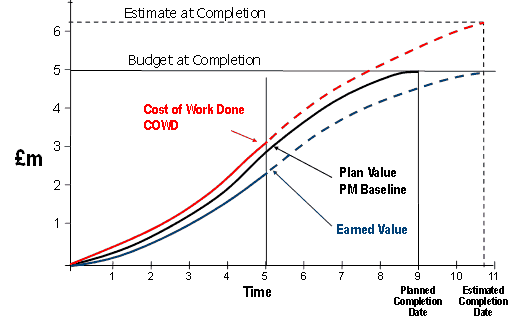Earned Value Equations are part of the Earned Value Management (EVM) process. EVM is considered a good practice approach used in the planning, management and control of projects and programmes. It is a project management technique, measuring cost and schedule against a baseline. The result is a simple set of metrics that provide early warnings of performance issues and allows for timely and appropriate adjustments to be made. The information generated helps to keep the project team focused on making progress.
Key formulas for earned value equations
Let’s take a look at some of the key formulas that are used in EVM:
- Planned Value (PV): This is the budgeted cost of work that is scheduled to be done at a point in time. The formula is PV = Budgeted Cost of Work x Planned % Complete
- Earned Value (EV): This is the budgeted cost of that work which is actually performed at a particular point in time. The formula is EV = Budgeted Cost of Work x Actual % Complete
- Actual Cost (AC): This is the actual cost that is incurred for all the work that is performed at a given point in time.
- Cost Variance (CV): This is the difference between the earned value and the actual cost. The formula is CV = EV – AC
- Schedule Variance (SV): This is the difference between the earned value and the planned value. The formula for this is SV = EV – PV
- Cost Performance Index (CPI): A simple measure of cost efficiency. The formula is CPI = EV / AC
- Schedule Performance Index (SPI): This is a measure of schedule efficiency, and the formula is SPI = EV / PV
- Estimate to Complete (ETC): This is an estimate of the cost to complete the remaining work and has the following formula ETC = (Budget at Completion – EV) / CPI
- Estimate at Completion (EAC): An estimate of the total cost for the project at completion of the project, the formula is EAC = AC + ETC.
These are just some of a significant number of EVM formulae. You will find that there are many other formulae that you will come across that can be used to measure a range of different aspects of the performance of your project.

The benefits of using Earned Value Equations
Earned Value Equations are vital when it comes to your project, and offer an objective way in which you can measure the performance of the project. It can also help you to identify any potential problems early on and this ensures that you are able to create contingency plans that will help you through those issues. Being able to make these plans early enough in the project means that you may be able to avoid going too much over budget or timeframe, if at all. Essentially, this can make a difference to the overall success of the project.
EVM can also help you to forecast the final cost of the project and its schedule, which allows you to see how well you are doing with the project budget and agreed timescales. Perhaps most importantly, it also offers you a basis from which you can make informed decisions regarding the project.
Summary of Schedule Metrics
Schedule Performance Index (SPI)
SPI = earned value / plan value
Schedule Variance (SV)
SV = earned value – plan value
Schedule Variance (time)
SV(t)= Earned schedule – Actual time
Schedule Performance Index (time)
SPI(t)= Earned schedule / Actual time
Revised Estimated Duration
= Original planned duration / SPI(t)
Also used for target dates EVM 1 and EVM2
Summary of Cost Metrics
Cost Performance Index
CPI = earned value / COWD
Cost Variance
CV = earned value – COWD
Independent Estimate at Completion
IEAC1=BAC/CPI
IEAC2=[(BAC-EV to date)/CPI 3 months]+COWD
IEAC3 = COWD + ((BAC – EV (cum)) / (CPI * SPI(t)))
IEAC4= COWD + ((BAC – EV (cum)) / (0.8CPI + 0.2SPI(t))
To complete performance measures
TCPI= Work remaining / Budget Remaining
TCPI (BAC-EV) / (AFC – COWD)
TSPI = Work to complete with authority / planned remaining budget within authority
TSPI – (Authority – EV ) / ( Authority – PV )